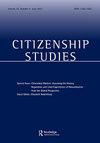Reorganization of borders, migrant workers, and the coloniality of power
IF 1.9
3区 社会学
Q3 POLITICAL SCIENCE
引用次数: 1
Abstract
ABSTRACT In the wake of the COVID-19 pandemic, many countries introduced measures to restrict mobility, both cross-border and internal. Nevertheless, people employed in certain sectors and designated as ‘essential workers’ were allowed to bypass these mobility restrictions. In this article, I take essential workers’ seemingly paradoxical assemblage of rights and value as a fruitful entry point to scrutinize both the tensions present in citizenship arrangements governing mobility and people and the contradictions of today’s labor and migration politics. Expanding on these contradictions, I argue that what appear to be ambiguities of citizenship – ambiguities which became more visible during the COVID pandemic – can actually be seen as contradictions inherent to citizenship itself. These ambiguities and contradictions reveal the coloniality in today’s nation states and their citizenship regimes. In short, we can relate them to colonial forms of power producing governable subjects and regulating mobility closely connected to processes of accumulation.边界重组、移民工人和权力的殖民化
在2019冠状病毒病大流行之后,许多国家采取了限制跨境和国内人员流动的措施。然而,受雇于某些部门并被指定为“必要工人”的人被允许绕过这些流动限制。在这篇文章中,我将基本工人看似矛盾的权利和价值组合作为一个富有成效的切入点,来审视管理流动性和人员的公民身份安排中存在的紧张关系,以及当今劳工和移民政治的矛盾。在这些矛盾的基础上,我认为,公民身份的模糊性——在COVID大流行期间变得更加明显——实际上可以被视为公民身份本身固有的矛盾。这些模棱两可和矛盾揭示了当今民族国家及其公民制度的殖民性。简而言之,我们可以将它们与殖民形式的权力联系起来,这些权力产生可治理的主体,并调节与积累过程密切相关的流动性。
本文章由计算机程序翻译,如有差异,请以英文原文为准。
求助全文
约1分钟内获得全文
求助全文
来源期刊

Citizenship Studies
POLITICAL SCIENCE-
CiteScore
3.60
自引率
11.10%
发文量
85
期刊介绍:
Citizenship Studies publishes internationally recognised scholarly work on contemporary issues in citizenship, human rights and democratic processes from an interdisciplinary perspective covering the fields of politics, sociology, history and cultural studies. It seeks to lead an international debate on the academic analysis of citizenship, and also aims to cross the division between internal and academic and external public debate. The journal focuses on debates that move beyond conventional notions of citizenship, and treats citizenship as a strategic concept that is central in the analysis of identity, participation, empowerment, human rights and the public interest.
 求助内容:
求助内容: 应助结果提醒方式:
应助结果提醒方式:


